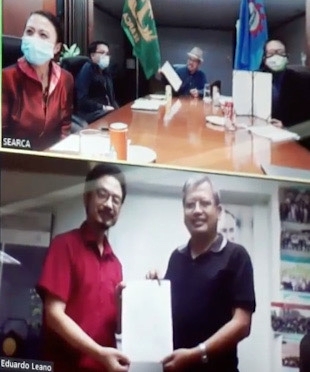The Southeast Asian Regional Center for Graduate Study and Research in Agriculture (SEARCA) and the Network of Aquaculture Centres in Asia-Pacific (NACA) signed a Memorandum of Understanding to collaborate on actions for the benefit of rural fisherfolk and smallholder farmers in the region.
SEARCA Director Dr. Glenn B. Gregorio and NACA Director General Dr. Jie Huang inked the accord in an online ceremony on 7 October 2020 with witnesses from both intergovernmental centers.
Dr. Gregorio said “SEARCA and NACA share the mandate for rural and smallholder farmers development, with NACA concentrating on aquaculture as a major sector of agriculture. Such partnerships toward Accelerating Transformation Through Agricultural Innovation (ATTAIN) is key to the success of SEARCA’s 11th Five-year Plan.” Dr. Gregorio indicated an intersection in NACA’s geographic coverage with some SEARCA member countries of the Southeast Asian Ministers of Education organization (SEAMEO) that SEARCA is mandated to serve.
 Upper screen: SEARCA Executive Director Dr. Gregorio (center) and Mr. Florendo (right-most) display signed MOU from the Los Baños office in the Philippines. (Left to right) Ms Carlos and Dr Ancog of the Emerging Innovation for Growth Department (EIGD) witness the cross-country virtual ceremony. Lower screen: NACA Director General Dr. Huang and Coordinator for Aquatic Animal Health Dr. Leaño flash signed MOU from Bangkok, Thailand, headquarters.Dr. Huang presented NACA as a technical cooperation program, initiated 30 years ago, that has grown to become an intergovernmental organization serving the interests of 19 member governments, including some in the ASEAN. He highlighted the vast linkages of NACA across Asia, including the Southeast Asian Fisheries Development Center, Aquaculture Department (SEAFDEC/AQD) based in the Philippines, as resource for aquaculture innovation among rural communities.
Upper screen: SEARCA Executive Director Dr. Gregorio (center) and Mr. Florendo (right-most) display signed MOU from the Los Baños office in the Philippines. (Left to right) Ms Carlos and Dr Ancog of the Emerging Innovation for Growth Department (EIGD) witness the cross-country virtual ceremony. Lower screen: NACA Director General Dr. Huang and Coordinator for Aquatic Animal Health Dr. Leaño flash signed MOU from Bangkok, Thailand, headquarters.Dr. Huang presented NACA as a technical cooperation program, initiated 30 years ago, that has grown to become an intergovernmental organization serving the interests of 19 member governments, including some in the ASEAN. He highlighted the vast linkages of NACA across Asia, including the Southeast Asian Fisheries Development Center, Aquaculture Department (SEAFDEC/AQD) based in the Philippines, as resource for aquaculture innovation among rural communities.
Dr. Rico C. Ancog, SEARCA Operations Consultant for Emerging Innovation for Growth (EIG), emphasized “the power of academe, industry and government interconnectivity to generate innovative, life-transforming solutions for farmers and farming families. This is the goal of the SEARCA innovEIGhts Model of open collaboration.”
Signing as a witness to the agreement, Dr. Eduardo M. Leaño, Coordinator for Aquatic Animal Health Programme of NACA shared the importance of continuing training and education outreach to farming and fishing communities using online communication modes demanded by the pandemic challenge today. Dr. Leaño offered NACA’s extensive set of experts who are able to provide training on aquaculture and aquatic resources management.
The forged partnership between SEARCA and NACA is towards the formulation of a joint project that is expected to contribute to a strengthened aquaculture sector in the region. Under the SEARCA EIG Program, various technological interventions across the aquaculture value chains will be explored, particularly those that increase production and logistics efficiency, fish produce quality and safety, and various value-adding activities, among others.
Other SEARCA witnesses to the ceremony were Mr. Joselito G. Florendo, Deputy Director for Administration; Ms. Lichelle Dara E. Carlos, Program Specialist on Open Collaboration and Agri-Incubation; Engr. Christopher T. Cabardo, Program Specialist on Knowledge and Technology Transfer; Dr. Diana Marie R de Silva, innovEIGhts Consultant; and Bethel Ann Dannah A Tamano, Project Assistant for EIG.
NACA is an intergovernmental organisation that promotes rural development through sustainable aquaculture and aquatic resources management. NACA seeks to improve the livelihoods of rural people, reduce poverty and increase food security. The ultimate beneficiaries of NACA are farmers and rural communities. NACA implements development assistance projects in partnership with research centres, governments, development agencies, farmer associations and other organisations. For more information, visit enaca.org.
SEARCA was established in 1966 as one of 26 specialist institutions of the Southeast Asian Ministers of Education Organization (SEAMEO). SEARCA is mandated to strengthen institutional capacities in agricultural and rural development through Education and Collective Learning, Research and Thought Leadership, and EIG. For more information, visit searca.org